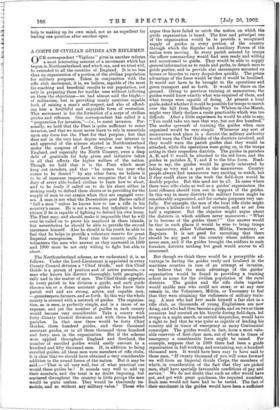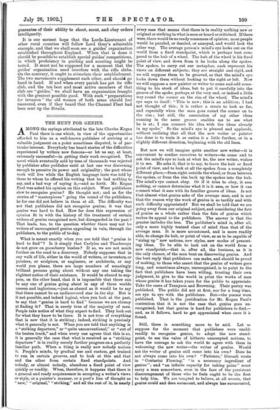A CORPS OF CIVILIAN GUIDES AND RIFLEMEN.
Ol7R correspondent "Tigilans " gives in another column a most interesting account of a movement which has begun in Northumberland, and which can, and we trust will, be extended to all the counties of England. It is no less than an organisation of a portion of the civilian population for military purposes. Taken in conjunction with the rifle club movement, it is, we believe, capable of the most far-reaching and beneficial results to our population, not only in preparing them for warlike uses without inflicting on them the objections—we had almost said the blight— of militarism, but in providing manly exercises capable both of raising a man's self-respect, and also of afford- ing him a healthful and enjoyable form of recreation. This movement is for the formation of a corps of civilian guides and riflemen. Our correspondent has called it a " preparation for invasion,"—i.e., to resist invasion. Per- sonally, we hold that the Fleet is quite sufficient to resist invasion, and that we must never learn to rely in essentials upon any force but the Fleet for that purpose ; but that does not in the very least degree weaken our interest in and approval of the scheme started in Northumberland under the auspices of Lord Grey,—a man to whom England, and especially the North Country, owes a deep debt of gratitude for help given and initiative taken in all that affects the higher welfare of the nation. Though we hold that it is the Fleet which must keep out invaders, and that " he comes too near who comes to be denied " by any other force, we believe it to be of immense importance to recognise that it is the duty of every able-bodied civilian to learn how to shoot, and to be ready if called on to do his share either in making ready to defend these shores or in providing for the supply of men to our armies when they are engaged over- sea. A man is not what the Dorsetshire poet Barnes called "full a man" unless he knows how to use a rifle in his country's cause. He is not a worse, but infinitely a better citizen if he is capable of fighting to defend his own home. The Fleet may, and should, make it impossible that he will ever be called on to prove his manhood in these islands, but nevertheless he should be able to provide the second insurance himself. Also he should in his youth be able to feel that he helps to provide a voluntary reserve for great Imperial emergencies. Next time the country calls for volunteers the men who answer as they answered in 1899 and 1900 must be not only willing to fight but able to shoot.
The Northumberland scheme, as we understand it, is as follows. Under the Lord-Lieutenant is appointed in every County Council division a "Chief Guide," and this Chief Guide is a person of position and of active pursuits,—a man who knows his district thoroughly, both geographi- cally and in the matter of men. The Chief Guide appoints in every parish in his division a guide, and each guide chooses ten or a dozen assistant guides who know their parish well and are strong, active, and capable men, —gamekeepers, farmers, and so forth. In this way the whole county is covered with a network of guides. The organisa- tion, as is seen, is perfectly simple, and is a cause of no expense, and yet the number of guides in each county would become very considerable. Take a county with forty County Council divisions and with three hundred parishes. In that case there would be forty Chief Guides, three hundred guides, and three thousand assistant guides, or in all three thousand three hundred and forty men in the organisation. But if the scheme ware applied throughout England and Scotland, the number of enrolled guides would easily amount to a hundred and fifty thousand men. If, in addition to being enrolled guides, all these men were members of rifle clubs, it is clear that we should have obtained a very considerable addition to the armed forces of the nation. But it may be said :—" That is all very well, but of what practical use would these guides be ? It sounds very well to add up their numbers, and the total is no doubt imposing, but scattered throughout the country in little groups the men would be quite useless. They would be absolutely im- mobile, and so without any military value." Those who argue thus have failed to catch the notion on which the guide organisation is based. The first and principal use of the organisation would be to provide a recogniied supply of guides in every portion of the country through which the Regular and Auxiliary Forces of the nation were moving. In every parish entered by troops the officer commanding would find men ready and willing and accustomed to guide. They would be able to supply general information as to roads and paths, to detach men to guide parties, and to provide also messengers mounted on horses or bicycles to carry despatches quickly. The prime advantage of the force would be that it would be localised. It would not have to be brought to the operations and given transport and so forth. It would be there on the ground. Owing to previous training at manceuvres, the guides would know exactly what was required of them, and what troops were capable of doing. At present a local guide, asked whether it would be possible for troops to march over the hill from Blackbury to Whiton-in-the-Marsh, might very likely declare a route practicable which was too difficult. After a little experience he would be able to say, " You could take ten men that way, but not five hundred." The modus operandi of training the guides when once organised would be very simple. Whenever any sort of manceuvres took place in a district the military authority would warn the Chief Guides of the districts involved, and they would warn the parish guides that they would be attached, while the operations were going on, to the troops acting in their respective districts. The guides in parishes A, B, and C would be attached to the red force, and the guides in parishes X, Y, and Z to the blue force. Need- less to say, the guides would be greatly interested by taking so very real a part in the manceuvres. Country people always find manceuvres very exciting to watch, but if they could share in the work the field-days would be doubly popular. But this need not be all. In cases where there were rifle clubs as well as a guides' organisation the local riflemen should turn out in support of the guides. In this way in many districts the military forces might be considerably augmented, and for certain purposes very use- fully. For example, the men of the local rifle clubs might be given a hillside to hold and entrench, and so set free half a regiment. But the objector might argue about the districts in which soldiers never manceuvre " What is to become of the guides there ? " Our answer would be that in such places it would be wise to bring troops to manoeuvre, either Volunteers, Militia, Yeomanry, or Regulars. It is not good for recruiting that there should be any part of the country where soldiers are never seen, and if the guides brought the soldiers to such forsaken districts nothing but good would accrue to all concerned.
But though we think there would be a perceptible ad- vantage in having the guides ready and localised in the maritime counties in case of an attempt at invasion, we believe that the main advantage of the guides' organisation would be found in providing a training school in arms for the civilian population of the rural districts. The guides and the rifle clubs together would enable men who could not enter, or at any rate remain in, the Volunteers, Militia, or Yeomanry to feel that they were obtaining the rudiments of military train- ing. A man who had first made himself a fair shot in a rifle club, as thousands of young Englishmen are now doing, and who had then become a guide, and on two or three occasions had scouted on his bicycle during field-clays, led troops in a, night march, or carried despatches, would have a right to feel that he was quite as capable of lending his country aid in times of emergency as many Continental conscripts. The guides would, in fact, form a most valu- able reservoir of first-class men, out of whom in times of emergency a considerable force might be raised. For example, suppose that in 1899 there had been a guide organisation in full working, and containing, say, a hundred thousand men. It would have been easy to have said to those men, " If twenty thousand of you will come forward we will form an Imperial Guide Corps, the members of which, in consideration of the fact that they are picked men, shall have specially favourable conditions of pay and service." We do not doubt that such an offer would have got, and got with great quickness, the required n.um.bere. Such men would not have had to be tested. The fact of their enrolment in the guides would have been a sufficient guarantee of their ability to shoot, scout, and obey orders intelligently.
It is our earnest hope that the Lords-Lieutenant of other rural counties will follow Lord Grey's admirable example, and that we shall soon see a guides' organisation established throughout England. When that is done it should be possible to establish special guides' competitions, in which proficiency in guiding and scouting might be tested. It must not be supposed for a moment that the guides' organisation need interfere with the rifle clubs. On the contrary, it ought to stimulate their establishment. The two movements supplement each other, and should go hand in hand. If and when every parish has got its rifle club, and the ten best and most active members of that club are " guides," we shall have an organisation fraught with the greatest possible good. With such " preparations for invasion " the old women of both sexes should feel reassured, even if they heard that the Channel Fleet had been sent up the Straits.







































 Previous page
Previous page